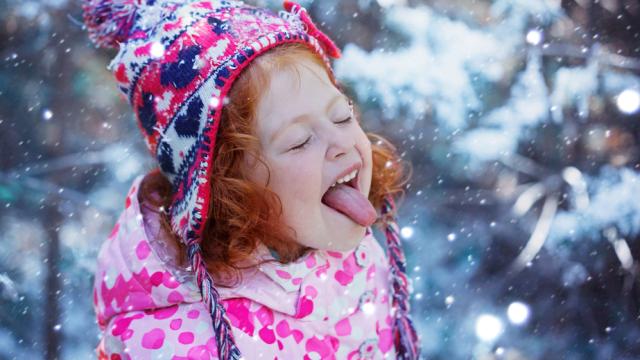Quick! Something white, cold, and flaky is falling from the sky. Should you start eating it, perhaps by the spoonful? Maybe — but, more likely, maybe not.
Certainly there are some advocates for snow-eating: The Romans drizzled honey on top of snow for a (disappointing-sounding) dessert. A more modern alternative is offered by this recipe for basic snow ice cream (snow + cream + sugar) from the University of Missouri’s Extension department, which brushes aside any concern about eating snow as “urban legend.” And you can usually spot at least a couple people trying to catch snowflakes on their tongues in a snowstorm.
People who are inclined to eat snow usually point out that they’re careful to get to the snow before it touches the ground. Or, barring that, they look for a patch that is deep, pure white, and undisturbed, so that they can get snow that’s as clean as possible. But recent studies suggest that, even before the snow ever touches the ground, it’s already the kind of mess you’d be better off keeping far clear of your mouth.
A 2015 study published in last month in Environmental Science by researchers at McGill University found freshly fallen snowflakes contained more than crystallised water; there was also a hefty dose of car exhaust. And a pair of earlier studies published in the Journal of Geophysical Letters by researchers at the University of Washington looked specifically at undisturbed snows from across the US and Canada. They found that these snows contained various levels of coal soot and dirt, even in samples taken fairly far away from cities.
So eating snow for fun is sounding like a less than ideal scenario, but what about eating snow for survival? Even if water is unavailable, eating snow directly may still not be the best option. It could lower your temperature, dehydrate you, or give you frostbite on your lips if you eat too much. The US Army Survival Guide suggests that you may be able to eat some if you have to, but (even in the relatively untouched snows in the Arctic) you should attempt to melt snow before drinking it. Or, even better, find a way to boil it and then let it cool first.
So, should you eat snow? We’re going to go with no — although, if you must, probably catching just a flake or two on your tongue probably won’t hurt.
